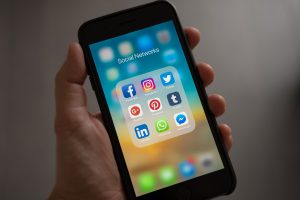How much time did you spend on Facebook this week? How about YouTube, or Twitter, or any other social media platform?

My guess is it’s more than you care to admit.
In my post on a regenerative attention economy, I mentioned the concern of former Google staffer Tristan Harris. He said technology is downgrading humans by preying on our animal brains. Sounds kind of harsh, doesn’t it?
Before I go any further, let me clarify that I am NOT anti-technology. I was using the internet before the web came along. I enjoyed easier access to new information and connections. And I saw a lot of value in technology, mostly from the internet. (That was when “You Got Mail!” was a big deal.) So perhaps it’s best to start by differentiating between the Internet and social media.
Different technologies and ownership
The internet is a global, connected system of computer networks. (In fact, the term internet is a portmanteau of interconnected network.) It distributes data to, within, and between computers and other devices. No one “owns” the internet per se, but many private, nonprofit, and public organizations control the infrastructure of servers and equipment. Google, Microsoft, and others operate as middlemen in the connections.
Social media are the websites and apps dedicated to interaction and engagement that “live” on the Internet. Prominent examples of social media include Facebook, Twitter, Instagram, YouTube, WhatsApp, and Snapchat. The companies who own these components of the Internet make a profit from hooking users into spending time on their platforms.
You give significant privileges to these companies for access. Perhaps it enables you to reconnect with old friends, interact with like-minded people, and share experiences. And it was a free choice. Your choice. True.
On the other hand, many believe technology has shifted from a crowdsourcing, community-building force for good to a divisive, exploitative force for profit.
Social media, in particular, has the negative potential to divide us, tap into our insecurities, and exploit our addictive tendencies. This happens when we become obsessed with followers, likes, and comments. We try to ignore the negatives while we enjoy the positives. But maybe we need to re-examine the negatives.
Tech Insider Views
Several individuals within the industry (such as Tristan Harris alluded to earlier), along with those who follow the industry, have raised many concerns.
Sean Parker, Napster co-founder and former Facebook president, said the following about the motivations of social media companies in a 2017 article in This Week in Silicon Valley:
“[W]e needed to sort of give you a little dopamine hit every once in a while, because someone liked or commented on a photo or a post or whatever … It’s a social validation feedback loop … You’re exploiting a vulnerability in human psychology … [The inventors] understood this, consciously, and we did it anyway.”
Matt Haig, author of Notes on a Nervous Planet, in an opinion piece for The Guardian, stated:
“More and more, it’s clear these platforms create divisions, exploit our insecurities and risk our health. They’re as bad as the tobacco industry.”
In a 2015 speech, Tim Klapdor, Innovation Technology Officer at Charles Sturt University in Australia said:
“So, who owns your data [when you provide it on social media sites]? Who and how do they define your identity? When you’re no longer in control of your data, what’s really going on? Quite frankly it’s Exploitation. What’s happening is that once you’ve put your data in these companies, they use this to test and experiment on you. You become part of their universe and domain, a resource they can utilise in a purely cynical and exploitative manner.”
Hence, the Dilemma of Social Media Addiction
How do we maintain the positives while eliminating the negatives? Is it even possible? Or maybe we can at least manage it?
In my mind, the internet has characteristics similar to the environment. None of us “owns” the whole thing. But we might own some part of it. We are all affected by it, and bear some responsibility for the effect of our actions. Just as businesses, governments, and individuals play a role in protecting the environment, perhaps the same is true for the internet.
Businesses (large and small) have missions, policies, and goals regarding digital strategy. Are they also obligated to consider the consequences of their actions? Tristan Harris believes that tech giants, in particular, have the responsibility (and capability) to cause positive change to happen.
Congress has also complained about tech giants. Sen. Josh Hawley (R-Mo.), for example, has proposed legislation to counteract elements of social media he deems addictive. He told NPR:
“The big tech platforms have adopted a business model that takes our private information without telling us, sells it without our consent, and then it tries to use exploitative and addictive practices in order to get us to spend more time on their platform, so they can take more stuff from us.”
Then there are the rest of us. How can we avoid exploitation and potential addiction?
- Be selective about the sites you visit and the data you share. (But do you really have a private life online?)
- Schedule how you allocate your online time. Set a timer if you have to.
- Increase your offline interactions with people. Have face-to-face conversations.
- Take frequent breaks when you are online.
- Be mindful of the role social media platforms play in your life.
As you contemplate things this week, ask yourself whether social media platforms are exploitative. Then focus on solutions.
